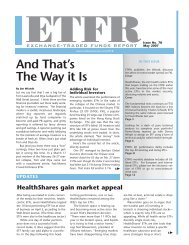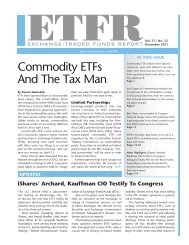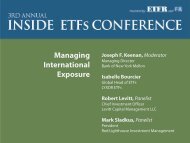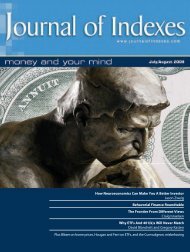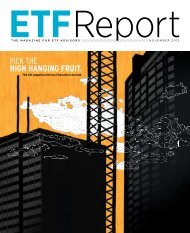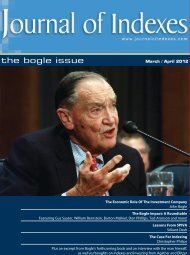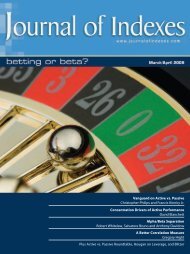How to Kill a Black Swan Remy Briand and David Owyong ...
How to Kill a Black Swan Remy Briand and David Owyong ...
How to Kill a Black Swan Remy Briand and David Owyong ...
You also want an ePaper? Increase the reach of your titles
YUMPU automatically turns print PDFs into web optimized ePapers that Google loves.
1. The right <strong>to</strong> have their money-manager/agents act<br />
solely on their behalf. The client, in short, must<br />
be king.<br />
2. The right <strong>to</strong> rely on due diligence <strong>and</strong> high professional<br />
st<strong>and</strong>ards on the part of our money managers<br />
<strong>and</strong> securities analysts who appraise securities for<br />
our portfolios.<br />
3. The right <strong>to</strong> dem<strong>and</strong> some sort of discipline <strong>and</strong><br />
integrity in the mutual funds <strong>and</strong> financial products<br />
that they offer.<br />
4. The assurance that our agents will act as responsible<br />
corporate citizens, res<strong>to</strong>ring <strong>to</strong> their principals the<br />
neglected rights of ownership of s<strong>to</strong>cks, <strong>and</strong> dem<strong>and</strong>ing<br />
that corporate direc<strong>to</strong>rs <strong>and</strong> managers meet their<br />
fiduciary duty <strong>to</strong> their own shareholders.<br />
5. The establishment of advisory fee structures that meet<br />
a “reasonableness” st<strong>and</strong>ard based not only on rates but<br />
dollar amounts, <strong>and</strong> their relationship <strong>to</strong> the fees <strong>and</strong><br />
structures available <strong>to</strong> other clients of the manager.<br />
6. The elimination of all conflicts of interest that could<br />
preclude the achievement of these goals.<br />
More than parenthetically, I should note that this final<br />
provision would seem <strong>to</strong> preclude the ownership of money<br />
management firms by financial conglomerates, now the<br />
dominant form of organization in the mutual fund industry.<br />
Among <strong>to</strong>day’s 40 largest fund complexes, only six remain<br />
privately held. The remaining 34 include 13 firms whose<br />
shares are held directly by the public, <strong>and</strong> an as<strong>to</strong>nishing<br />
<strong>to</strong>tal of 21 fund managers owned or controlled by U.S. <strong>and</strong><br />
international financial conglomerates—including Goldman<br />
Sachs, Bank of America, Deutsche Bank, ING, John Hancock<br />
<strong>and</strong> Sun Life of Canada. Painful as this separation might be,<br />
it is the single most blatant violation of the principle that<br />
“no man can serve two masters.”<br />
Of course it will take federal government action <strong>to</strong><br />
foster the creation of this new fiduciary society that I<br />
envision. Above all else, it must be unmistakable that government<br />
intends, <strong>and</strong> is capable of enforcing, st<strong>and</strong>ards<br />
of trusteeship <strong>and</strong> fiduciary duty under which money<br />
managers operate with the sole purpose <strong>and</strong> <strong>to</strong> the exclusive<br />
benefit of the interests of their beneficiaries—largely<br />
the owners of mutual fund shares <strong>and</strong> the beneficiaries of<br />
our pension plans.<br />
While the government action is essential, however, the<br />
new system should be developed in concert with the private<br />
investment sec<strong>to</strong>r, an Alex<strong>and</strong>er-Hamil<strong>to</strong>n-like sharing<br />
of the responsibilities. The task of returning capitalism <strong>to</strong><br />
its ultimate owners will take time. But the new reality—<br />
increasingly visible with each passing day—is that the<br />
concept of fiduciary duty is no longer merely an ideal <strong>to</strong> be<br />
debated. It is a vital necessity <strong>to</strong> be practiced.<br />
What I’ve passionately advocated in these remarks is<br />
hardly widely shared among my colleagues <strong>and</strong> peers. But<br />
soon, perhaps, many others will ultimately see the light.<br />
Only last week the idea of governance reform got encouraging<br />
support from Professor Andrew W. Lo of MIT, one of<br />
<strong>to</strong>day’s most respected financial economists: . . . the single<br />
most important implication of the financial crisis is about the<br />
current state of corporate governance . . . a major wake-up call<br />
that we need <strong>to</strong> change [the rules]. There’s something fundamentally<br />
wrong with current corporate governance structures, [<strong>and</strong>]<br />
the kinds of risks that typical corporations face <strong>to</strong>day.<br />
In sum, the change in the rules that I advocate—applying<br />
a federal st<strong>and</strong>ard of fiduciary duty <strong>to</strong> their clients<br />
for institutional money managers—would be designed<br />
in turn <strong>to</strong> force these managers <strong>to</strong> use their own ownership<br />
position <strong>to</strong> dem<strong>and</strong> that the managers <strong>and</strong> direc<strong>to</strong>rs<br />
of the corporations in whose shares they invest honor<br />
their own fiduciary duty <strong>to</strong> the holders of their shares.<br />
Finally, it is these two groups that share the responsibility<br />
for the prudent stewardship over corporate assets <strong>and</strong><br />
investment securities alike that have been entrusted <strong>to</strong><br />
their care, not only reforming <strong>to</strong>day’s flawed <strong>and</strong> conflictridden<br />
model, but developing a new model that, at best,<br />
will res<strong>to</strong>re traditional ethical mores.<br />
I owe it <strong>to</strong> Justice Harlan Fiske S<strong>to</strong>ne’s legacy <strong>to</strong> conclude<br />
my remarks with yet one more quotation from his<br />
profound <strong>and</strong> prescient 1934 speech:<br />
In seeking solutions for our social <strong>and</strong> economic maladjustments,<br />
we are <strong>to</strong>o ready <strong>to</strong> place our reliance on what (the<br />
policeman’s nightstick of) the state may comm<strong>and</strong>, rather<br />
than on what may be given <strong>to</strong> it as the free offering of good<br />
citizenship . . .<br />
Yet we know that unless the urge <strong>to</strong> individual advantage has<br />
other curbs, <strong>and</strong> unless the more influential elements in society<br />
conduct themselves with a disposition <strong>to</strong> promote the common<br />
good, society cannot function . . . especially a society which has<br />
largely measured its rewards in terms of material gains . . .<br />
We must (square) our own ethical conceptions with the traditional<br />
ethics <strong>and</strong> ideals of the community at large. (There is)<br />
nothing more vital <strong>to</strong> our own day than that those who act as<br />
fiduciaries in the strategic positions of our business civilization,<br />
should be held <strong>to</strong> those st<strong>and</strong>ards of scrupulous fidelity which<br />
(our) society has the right <strong>to</strong> dem<strong>and</strong>.<br />
Note: The views expressed in this speech do not necessarily reflect the views of Vanguard’s present management.<br />
Endnotes<br />
1 I’m speaking here of the “buy-side” analysts employed directly by these managers. The conflicts of interest facing “sell-side” analysts were exposed by the investigations<br />
of New York At<strong>to</strong>rney General Spitzer in 2002–2003.<br />
2 Securities & Exchange Commission decision, March 15, 1981.<br />
3 2002 data: pg. 199, “The Battle for the Soul of Capitalism,” by John C. Bogle, Yale University Press, 2005.<br />
www.journalofindexes.com July/August 2009<br />
41




